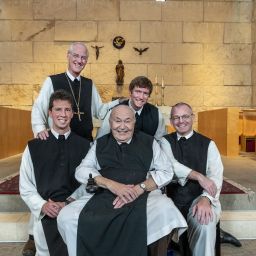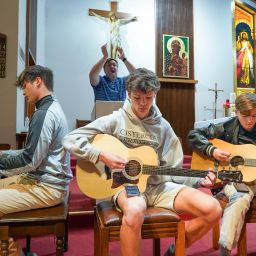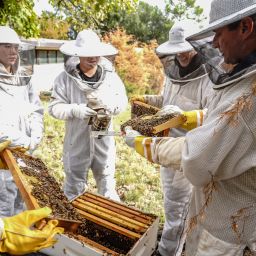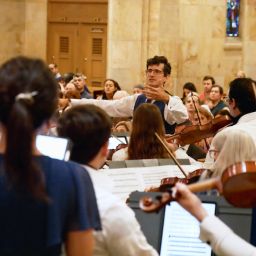“It’s no surprise that in poetry, even in Scripture in some instances, the writing of theologians and saints, the bee is often looked at with this sense of wonder,” said Father Raphael Schaner, O. Cist, of Our Lady of Dallas Cistercian Abbey.
Father Schaner, who proudly continues the age-old tradition of wondering about the bee, has undertaken the task of caring for more than 150 thousand honeybees at the Cistercian abbey. The six hives currently at the abbey were donated by members of the Cistercian school community, the Oliver and Chan families.
Tim Oliver and his wife Nancy, parents of Cistercian freshman Will Oliver, began caring for bees four years ago, when they found a swarm in their attic. After transferring the insects outside, they began tending to them—and eventually grew the original group of bees into five hives, Oliver said.
“For the four years that we had them, we’ve never had more prolific flower and vegetable gardens,” Oliver shared.
The Olivers donated their hives to Cistercian in mid-July of 2023. Transfer was no easy task. Oliver, along with his son Will, Father Ambrose Strong, and Father Schaner, “suited up” in their beekeeping gear to face the daunting task of transferring thousands of bees in the heat of summer.
“In the summertime, it’s so warm inside the hive that the bees do something called ‘bearding’ where, instead of being inside the hive, they cover the outside of the hive,” Oliver explained. “So, [we] set off misters which kind of forced the bees inside for a dry place. And then we had to basically seal up each hive once they were all inside.”
The crew loaded the bees into a pickup truck, moved them to Cistercian abbey, and unsealed the hives.
“It’s a 1-2-3-go! Everyone, strip off that tape and run,” Oliver said.
The Chan family, another beekeeping family in the community, also donated hives—and a robust assortment of beekeeping equipment—to Cistercian.
Embracing apiculture
Since the bees made their home at Cistercian, they have been a source of wonder for the students at the school.
Father Schaner, who teaches an agriculture elective, incorporates apiculture, the science of beekeeping, into the curriculum.
“In these cold days, we’re learning soil science; we’re learning the history of agriculture; we’re learning more the theory of farming; and so, we’ll learn bee biology, the various tools of beekeeping,” he explained. “Once it is warm enough, I hope to have the students suit up, and we’ll go out and look at the hives.”
Already, some Cistercian students have had the opportunity to assist with a hive inspection on Nov. 11, 2023 and, two weeks later, a honey harvest which yielded nearly seven gallons of honey. During inspection, students surveyed the brood and honey frames and checked the overall health of the hives.
“Once we open the hives, everyone is zoned in, whether that’s from a fifth grader to a senior to a monk,” Father Schaner said. “Everyone is just, again, so entranced by the beauty, the rhythm, the intricacies of the hive.”
Oliver still lends his assistance with the bees, visiting monthly to check on the hives and educate the beekeepers at Cistercian.
“I’ve gone from a beekeeper to a bee consultant,” he shared.
Witnessing students with the bees, Oliver noted the boys’ fascination with the swarming creatures.
“I think what a lot of them like is just how incredibly interesting and calm the bees are,” Oliver said. “If you’re at peace and calm as you’re working the bees, they just continue doing their work.”
Father Paul McCormick, O. Cist., headmaster of Cistercian, commented on the hands-on apiculture opportunity, saying, “Seeing Father Raphael and his students in their full body suits extracting the honey as the bees encircle them, I know these are memories they will share for a lifetime; and I can’t help but imagine there will be more than a few who themselves embrace this hobby later in life.”
Cultivating wonder
The arrival of the bees on campus was a continuation rather than a diversion from a trend of promoting the vitality of the natural environment at Cistercian, Father Schaner said.
“In recent years, even before I entered, the school has been trying to cultivate more and more indigenous flora,” he said, “so getting trees and plants that are more indigenous to Texas—still beautiful, but ones that won’t choke out the native plants.”
The school also installed solar panels and a rainwater collection tank.
“We want to do our part in providing an environment that is conducive to God’s creatures,” he shared.
The bees contribute to the mission by pollinating the local area.
“Agriculture in the U.S. is so dependent on pollinators, and honeybees are one of our primary pollinators,” Oliver said. “They really do make such a positive impact in keeping the whole ecosystem going.”
Since undertaking the care and keeping of bees, Father Schaner has absorbed an abundance of facts about the contribution of bees to agriculture—as well as a host of other fascinating pieces of trivia about the insect.
“They have these hair follicles all across their bodies, even on their eyes. They cannot see the color red, but they can see into the ultraviolet spectrum. The queen bee can lay anywhere from 1,000 to 2,000 eggs per day,” he shared. “I could keep going.”
Father Schaner’s fascination with the bee points to a simple fact: Bees are fascinating.
“As you gaze at these tens of thousands of workers that are all contributing to the common good… It’s not for their personal benefit, because the honey that they make, they will not even survive to enjoy it,” he reflected, adding that each bee only makes a twelfth of a teaspoon of honey in its lifetime. “They are enjoying the work of a previous generation, and they are working for the benefit of the upcoming generation. And so, all of that really instills a sense of wonder.”
Father Schaner sees significance in the life of the bee, a kind of lesson that the insect’s caretakers can learn.
“Bees had often been used as a symbol of not only the goal of humanity, but even in a smaller sense in the Catholic tradition of the monastic goal, where you have this ‘hive mind,’ but not in a kind of mindless robotic sense, rather in the sense of the work that I do is for the benefit of everyone else… It’s that sense of the individual working with the collective for the common good, but all with that sense of compassion and selflessness,” he said. “It is certainly, I think, a Christian and even more specifically a monastic value.”










